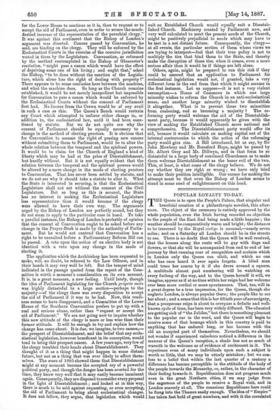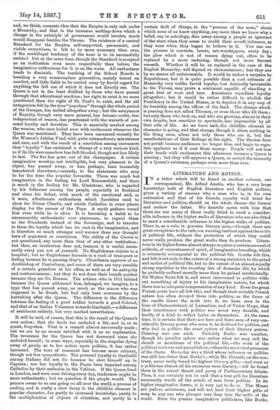POPULAR LOYALTY TO-DAY.
THE Queen is to open the People's Palace, that singular and benefioial creation of a philanthropic novelist, this after- noon. The object of the ceremony is entirely approved by the whole population, even the Irish having recorded no objection to the people of the East End being made a little happier ; the weather should be comparatively warm and bright; the distance to be traversed by the Royal cortege is unusual,—nearly seven miles ; and on a Saturday all London should be in the streets to see. There is no doubt that the Queen will be well received, that the houses along the mate will be gay with flags and flowers, or that she will be accompanied from end to end of her journey by that running roar of recognition and acclaim which in London only the Queen can elicit, and which no one who has once heard it ever again forgets. A blind man could trace her course by it if she drove around a square. A multitude almost past numbering will be watching on every furlong of the way, and to the Queen herself it will, we imagine, appear as if at no time within her reign had her welcome ever been more cordial or more spontaneous. That, too, will in a great degree be a true impression, for the Queen, though she neglects London, is always popular there; the people like to see her about ; and a sense that this is her fiftieth year of sovereignty, that a prosperous reign is about to overpass a definite and well- known cycle of time, has been very widely diffused. The educated are getting sick of " the Jubilee," but there is something pleasant to the popular ear in the word, and the Queen will begin to receive some of that homage which in this country is paid to anything that has endured long, or has become with the old an accepted part of themselves. Nevertheless, we should not wonder if experienced onlookers noticed a difference in the manner of the Queen's reception, a shade less not so much of warmth in the welcome as of evidence of excitement in it. The experience even of many individuals upon such a subject is worth so little, that we may be utterly mistaken ; but we con- fess to a belief that within the last quarter of a century a difference has become perceptible in the attitude of the body of the people towards the Monarchy, or, rather, in the character of their feeling towards it. Republicanism does not progress ranch even in the great Northern cities, if we may judge from the eagerness of the people to receive a Royal visit, and in London scarcely at all. The conscious Republicans here could be flung into the Thames easily enough. The idea of "Empire" has taken fast hold of great numbers, and with it the correlated and, we think, accurate idea that the Empire is only safe under a Monarchy, and that in the immense melting-down which a change in the principle of government would involve, mush would disappear besides the Throne. The existence of a central Standard for the Empire, self-supported, permanent, and visible everywhere, is felt to be more necessary than ever, if the centrifugal tendency of the hour is to be successfully reeisted. But at the same time, though the Standard is accepted as an institution even more respectfully than before, the imaginative enthusiasm for it is on the wane. All enthusiasm tends to diminish. The teaching of the School Boards is breeding a very commonplace generation, mainly intent on comfort, and little liable to be carried away by fervid regard for anything the full use of which it does not directly see. The Queen is not in the least disliked by those who have passed through that educational machine; her right to exist is no more questioned than the right of St. Paul's to exist, and the old antagonism felt by the true " populace " through the whole period of the Georges, has melted altogether away ; but the acceptance of Royalty, though even more general, has become cooler, less independent of reason, less penetrated with the warmth of per- sonal loyalty and devotion. This is especially marked among the women, who once boiled over with excitement whenever the Queen was mentioned. They have been canvassed recently for the Women's Jubilee Fnnd with quite extraordinary minuteness and care, and with the result of a conviction among canvassers that " loyalty " has sustained a change of a very curious kind, as if its life were somehow less full-blooded, though not less likely to last. The fizz has gone out of the champagne. A certain imaginative worship, not intelligible, but very pleasant to its object, has passed away, or has, perhaps, been insensibly transferred elsewhere,—namely, to the statesman-who may be for the time the popular favourite. There was much hot imagination in the feeling for Lord Beaconsfield, and there is much in the feeling for Mr. Gladstone, who is regarded by his followers among the people, especially in Scotland and since his defeat, with mach of the emotional and, as it were, affectionate enthusiasm which Jacobites used to show for Prince Charlie, and which Catholics in some places display for the person of the Pope. A myth gathers round him even while he is alive. It is becoming a habit to be unreasonably enthusiastic over statesmen, to regard them as the Standards instead of the Sovereign, and to transfer to them the loyalty which has its root in the imagination, and is therefore so much stronger and warmer than any thought born of argument or conviction. The utility of the Crown is not questioned, any more than that of any other institution; but then, an institution does not, because it is useful, neces- sarily carry you out of yourself. No Englishman objects to a hospital ; but no Englishman hurrahs in a rush of transport or feeling because he is passing Guy's. Churchmen approve of an Archbishop of Canterbury, and some of them are very sensible of a certain grandeur in his office, as well as of its antiquity and continuousness ; but they do not draw their breath quicker because they see Dr. Benson. The artisan who in 1851 fainted because the Queen addressed him, belonged, we imagine, to a type that has passed away, as much as the mason who was supposed to be drunk, but had only been overcome by the hurrahing after the Queen. The difference is the difference between the feeling of a good soldier towards a good Colonel, and that of an Italian Volunteer towards Garibaldi,—a difference of sentiment entirely, but very marked nevertheless.
It will be said, of course, that this is the result of the Queen's own action; that she leads too secluded a life, and is, so to speak, forgotten. That is a remark almost universally made; but we are by no means satisfied with it as an explanation. The reverence for the Queen has not decreased since she secluded herself ; in some ways, especially in the singular dying away of gossip as to her action upon politics, it has rather increased. The tone of comment has become more reticent, though not less sympathetic. The personal loyalty to Garibaldi among Italians did not die because he shut himself up in Caprera ; nor has loyalty to the Popes been impaired among Catholics by their seclusion in the Vatican. If the Queen lived in London, and were seen driving every day, tradesmen might be more enthusiastic ; but we question if the people would. The process seems to ns one going on all over the world, a process of cooling, and is really a slow decay in the childlike element in popular character, doe partly to increased knowledge, partly to the multiplication of objects of attention, and partly to a certain drift of things, in the "process of the suns," about which none of us know anything, any more than we know why a belief, say in astrology, dies away among a people as ignorant of the stare when they cease to credit their occult influence, as they were when they began to believe in it. You can see the process in converts, lovers, art.worshippers, every day ; the glow which is not of reason dying out, often to be replaced by a more enduring, though not more fervent warmth. Whether it will be so replaced in the case of the English Monarchy, will depend on circumstances ; but they are by no means all unfavourable. It would be rather a surprise to Republicans, bat it is quite possible that a cool estimate of Monarchy very unlike fervid loyalty, bat distinctly favourable to the Throne, may prove a sentiment capable of standing a great deal of wear and tear. Americans repudiate loyalty altogether ; but it would be rather difficult to abolish the Presidency in the United States, or to deprive it in any way of its headship among the offices of the land. The change which is passing does not affect Thrones, or even those who fill them ; but only those who look on, and who are growing, almost in their own despite, lees sensitive to spectacle, leas impressible by all that side of life. As we have said, the childlike element in character is going, and that change, though it alters nothing in the thing seen, alters not only those who see it, but the manifestations of their feelings at the eight. The theatre does not perish because audiences no longer hiss, and begin to regu- late applause as if it cost them money. People will not lose their heads with excitement this afternoon because a Queen is passing ; but they will approve a Queen, or accept the necessity of a Queen's existence, perhaps even more than ever.



































 Previous page
Previous page